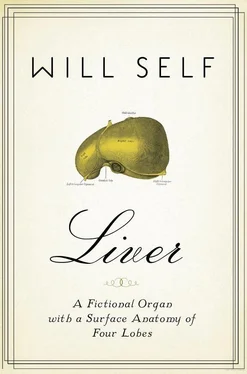Finally, they were in a cab, a Mercedes as snug and black as an orthopaedic boot. You don’t see those any more — all the victims of the polio epidemics after the war; grown up — dead, I suppose . As the cab rolled away Joyce admonished herself. Stop criticizing Isobel: this is harder for her than it is for you, because she’s not like you. She’ll have to go home alone — and there is no home for her, really. No boyfriend — or lover. What’s she doing with her life? A photographic project of some kind — an installation, she calls it. Peculiar term, more military than artistic .
Neubahn Birchstrasse. Glattalbahn. Flughofstrasse . The very words on the signs looked heavy, with their dumpy vowels and chunky consonants. The blocks of flats and factory buildings lining the roadway were as fat as the back of the cab driver’s neck.
Isobel had told her mother that she was meticulously photographing the contents of some rooms in the Soho district of London, rooms that had been left sealed up decades before. She had grown animated as she described Mr Vogel’s abandoned office, which was cluttered with Gestetner machines, rubber stamps, typewriters and all sorts of other office equipment from the 1950s — and even earlier — all of it still boxed up.
Joyce had nodded, making encouraging noises, while Isobel explained that hers was a visual inventory of objects that had, sort of, defied time. But really, her mother had thought, this was a nonsense , not proper work at all — and certainly not art — more a kind of play that the grown-up girl indulged herself in, and that various public bodies — colleges, councils, libraries — were prepared to indulge her in as well, by supporting it with grants.
Christ have mercy upon us! So dull this was: the plunge of the underpass beneath the haunch of the wooded hill.
When, up in the sky, Joyce had been ridiculously scared of dying — while not for a second considering the bursting of all those other bubble-worlds of thought, each so fragile and entire, each brilliantly reflecting the entirety of the others — the fear had blanked out the mundanity of her own well-administered death, which was all about her now, like cold dirty snow blanketing the verges.
Isobel got out her mobile phone and switched it on. Joyce blurted, ‘Please, Isobel, we agreed — ’
‘I was only checking it worked, Mum,’ she began calmly enough, then choked up the scale: ‘I. Might. Need to make a call — later. Tomorrow. Y’know’, before hitting the high note of tears. Isobel was suddenly a little girl once more, sitting on her bedroom floor, the minute displacement of a tableau of tiny dollies having provoked this huge grief. Then, it came — or, rather, Joyce moved ever so slightly towards it. Out from the shadow of her own death, Joyce crept into the wan sun of her love for the daughter she had borne and beared.
The two women cried in one another’s arms, oblivious to the Mercedes’s progress, which swept downhill between prosperous villas, then apartment blocks, then past the green splash of the university’s grounds. A tram clang-ting-whooshed in the opposite direction, and to the right of the road the Limmat River shone, touched with the same golden lambency that played upon the domes, steeples and towers of Zürich’s old town.
Joyce had read — because that is what she had been taught to do — a selection of the relevant literature. The liver cancer and the imminence of death itself — these would, she had been informed, take up all her energies. The workaday world would, almost comfortably, recede, milk deliveries and tax returns taking on the character of metaphysical abstractions, now that the most important unknowns were on the point of being known.
And yet. and yet, it hadn’t been like that at all. True, she did find herself caught up — lost even — in the roomy soutane of death, its folds at once heavy and invisible, but there remained no escape from the trivial, the ugly, the banal.
Back in Birmingham they had argued about the hotel. Isobel favoured somewhere with all the four-star trimmings, while Joyce was set on thrift: not because she wished to deny herself — why bother? — but because she wanted, even at this late hour, to deliver a final homily to her only child on the virtues of parsimony.
‘Why, Mum? Why do you want to spend the night in a shitty little guest house?’ Isobel had been sitting in front of the PC, which was on the rolltop desk in the small room that used to be her father’s study. ‘This place’, she tap-pinged the screen, ‘is meant to be very nice — ’
‘Nice?’
‘Well, stylish.’
Stylish . Joyce grimaced. Yes, she understood that this was hard on her daughter, but must she organize every single particular herself? This may have been a small administrative problem — renting the antechamber to death — but beyond it Joyce sensed Isobel’s psychic hinterland as office suite after office suite, all staffed by time-serving incompetents, not one of whom would have had the gumption to order a toner cartridge for the photocopier, were it not for Joyce’s assiduous management.
Phillimore’s detailed assessment had to be obtained, and Joyce’s birth certificate. There were the first phone calls to Switzerland, followed by the to and fro of emails arranging dates and details. Then the home visits had to be set up. Trained hospice nurses came, who acted as outreach workers. ‘Suicide assistants’, they called themselves, with what Joyce thought of as typically Swiss practicality. All of this she had had to do herself, the unspoken truth being that were Joyce to leave it for too long, Isobel would prove utterly incapable.
Joyce had been initially diagnosed in September of the previous year, but then, just before Christmas, she was given six months to live. Some present. Given them grudgingly, by Phillimore, in a way that, on reflection, she imagined that he considered flattering to her no-nonsense demeanour: ‘Even with further chemo, Jo, 50 per cent of people with this kind of cancer will be dead in six months.’ Jo! Jo! The nerve of the man . Some present. Some time. No hope.
Although it was now the beginning of March, Joyce didn’t feel too bad . She might, under other, easier-to-delegate circumstances, have lingered into spring, to see the bulbs she had planted — a prayerful act, on her knees, hands pressed together in the wormy earth — come up in the garden. Lingered to see the cherry blossom spraunce up the suburb. Lingered to hear Scoresby’s — and her own — Requiem performed at the Adrian Boult Hall. Kyrie eleison .
Might have, were it not that Joyce had seen enough people dying from terminal disease not to appreciate its awful, creeping normalcy: despite the black abyss being clearly in view, there was still this cup of tea close at hand, to drink or disdain; and so they nursed it — until it was too late.
Might have, were it not for her professional experience of doctors and their manner, which was nothing but the irrelevant furnishing of death, the shelves and bookcases installed in the earthen sides of the rabbit hole you tumbled down. As for treatments — what were they? A jar of marmalade you took up in falling — then dropped.
Might have, were it not that Isobel was incapable of filling in a form properly, and had to bring her grant applications — together with her laundry — home to Mummy in Brummie.
Standing on the cobbles of the Rennweg outside the Widder Hotel, Joyce felt the chill grit of her own soiled underwear and flipped into compassion for the dumpy thing , who was paying off the cab with burnt-sienna Swiss francs. Isobel, who tried to convince her mother that she lived an exciting bohemian life in London, but whose breathless accounts of hanging out at the notorious Plantation Club fell on sceptical ears: ‘And Trouget, y’know, he was the presiding spirit for, like, years. until he died.’
Читать дальше












